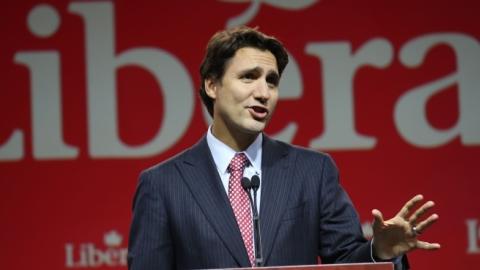Canada's Liberal Party leader, Justin Trudeau, has been riding high in the polls and many observers consider him well-positioned for the October general election. Yet Britain's election results contain some warning signs that Trudeau should heed.
Winner Takes All. In first-past-the post constituencies, if voters unhappy with the incumbent party have multiple options, votes for change can split allowing the government party's candidate to win. This appears to have happened in several U.K. constituencies, where Labour candidates fought Liberal Democrats, U.K. Independence Party and sometimes another nationalist party for the change vote.
Polls and Observers Can Be Wrong. An old adage, but increasingly true in an age when many voters avoid phone surveys (especially during dinner time) and some opt to send a message of discontent via voting intention surveys and tweets, while in the end voting in a different way. British pollsters are not unusually inept: the same phenomenon has been seen in Canada and other democracies. And in today's social media rich environment where parties insinuate tweets and viral videos directly and surreptitiously, what's trending may be an instance of "astroturf" rather than "grass roots" mobilization.
Mockery Can Be Deadly. British politics is known for its biting humor, from “Yes, Minister”":http://www.imdb.com/title/tt0080306/ to the "“Spitting Image”":http://www.imdb.com/title/tt0086807/ television series. British Conservatives' ridicule focused on Labour leader Ed Milliband earnest but often awkward persona - so much so that the "Bagehot column in The Economist suggested that they may have overdone it. Yet it worked, raising doubts about whether Milliband was sufficiently prime ministerial, a test that incumbent Prime Minister David Cameron had obviously met. Prime Minister Harper may not be Canadians' favorite political personality, but he too fits in the role of prime minister for many Canadians. Mocking Trudeau as unready could be effective in Canada too.
A Steady Hand Beats a Coalition of Chaos. The British economy saw just 0.3 percent GDP growth in the first quarter of 2015 and most voters in the U.K. don't feel certain about the recovery. Cameron played on the worry that a hung parliament, minority government, or coalition would make things worse, suggesting that voting Labour in could lead to a coalition with the Scottish National Party (a trick borrowed from Stephen Harper, as I noted in these pages previously Stoking these fears helped Cameron to solidify his vote and gave him a slim majority (much of it at the expense of his former coalition partner, Nick Clegg and the Liberal Democrats). Trudeau will be tempted by the media to discuss the possibility of a coalition or cooperation with Thomas Mulcair and the New Democratic Party before an election, and even not ruling out such collaboration might help Harper to portray the alternative to another Conservative government in Ottawa as chaos in uncertain economic times.
Likeability is Not Enough. Nick Clegg is youthful and likeable, and entered the election as leader of the third biggest caucus in the House of Commons. UKIP's Nigel Farage was one of the most engaging party leaders, and had momentum throughout the year. Both of them have now resigned their party's leadership following poor election showings. Justin Trudeau has youth and likeability going for him, but would be foolish to rely on these characteristics too much. Canadians might prefer having Trudeau at their summer barbecues over Harper or Mulcair, but a winning personality can make you a lovable loser rather than a strong leader in voters' eyes.
All these lessons come with the caveat that Britain is not Canada, that local issues matter, and while the Scottish nationalists have been riding high, Quebec nationalists have not. And while Britain is part of the European Union, whose economy has been sluggish and unsteady, Canada is next door to the United States, which has seen better economic performance lately. Still, political scientists' and pollsters' models offer only theoretical predictions. Voter behaviour in an actual election provides an insight into the complicated mood of a comparable electorate, and it would be a mistake not to observe and learn from Britain's example less than six months before Canadians go to the polls.
















